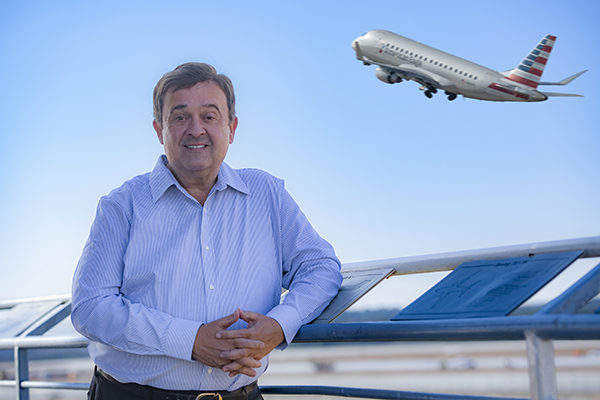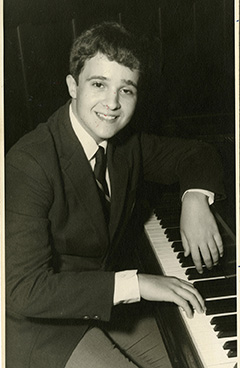David McKenas’ work saved lives in the skies
Alumnus doctor's plan helped put defibrillators on airplanes

In 1996, Dr. David McKenas ’77 had a revolutionary idea for his employer, American Airlines: The installation of defibrillators on airplanes to help those stricken with sudden cardiac arrest.
McKenas, who then served as American’s corporate medical director, knew the proposal was risky and expensive. So he decided to pitch the plan to American Airlines CEO Robert Crandall in the ultimate closed-door meeting — during the CEO’s annual physical examination.
“Crandall was a tough cookie, a tough CEO,” McKenas recalls. “He demanded expertise, perfection and on-time performance. I had a needle in his arm and he was down to his skivvies, so I told him: If we put this device on board, we’ll save at least 60 lives a year on American. But we’ll need to train 25,000 flight attendants. He said: ‘Tell me more.’”
The heart-to-heart talk between doctor and CEO not only led to American becoming the first airline to install automated external defibrillators (AEDs) in 1997, but it would become a federal requirement for all commercial airliners by 2004. Today, the devices that send an electric shock to restart a heartbeat are commonplace in government buildings, office buildings, schools and athletic facilities.
Last year, McKenas wrote a book with business journalist Dan Reed about the experience, Shocked: Life and Death at 35,000 Feet. The book (available in print and electronic formats at amazon.com and barnesandnoble.com) examines McKenas’ effort to bring AEDs into airplanes, while also looking back on his youth, his time at Binghamton University, and his pre-American work with the Air Force and NASA.
“I’m not a writer, but I felt compelled to tell the story,” McKenas says. “It’s historical and memoir-ish. To me, it was always interesting how defibrillators got into the hands of flight attendants.”
The case for AEDs
McKenas joined American in 1992 after spending six years supporting NASA, where he coordinated emergency care for astronauts as a lead aerospace doctor. He became American’s corporate medical director in 1994 and was researching the health risks of flying when he realized that American was losing up to 60 passengers a year on its planes due to sudden cardiac arrest.
“It’s not rocket science to say that the longer you are in an airplane, something will happen medically,” he says. “When you put people in a pressurized tube for eight hours, something is going to happen.”
McKenas also realized that new, portable AEDs were the solution. The smaller devices could fit and be used in more practical places, unlike the bulky defibrillators seen on 1960s and ’70s televisions shows such as Emergency!
While McKenas inspected numerous AED models, he lobbied the group that would ultimately be responsible for saving hundreds of lives: flight attendants.
“I went to the unions first and became good friends with [flight attendant union president] Denise Hedges,” McKenas recalls. “I brought the defibrillators to her and asked if she thought flight attendants could use them. She said yes, but my worry was that they would try to negotiate for more money. They never did that. Flight attendants have always been there for the safety of the traveling public. Denise saw this as a natural extension of that role.”
McKenas personally trained the first 1,200 flight attendants around the country, emphasizing that every minute of aid delay decreases the ailing passenger’s chance of survival by 10%.
“By the time you get to the ground or back to the gate, they’d be dead,” he says.
McKenas recalls that some flight attendants were initially “petrified” during training, but the AED voice instructions proved beneficial.
“As soon as they could hear the machine ‘talk’ to them, they’d say: ‘It’s like the voice of God telling me what to do,’” he recalls.
By 1997, the first AEDs were on American aircraft and McKenas was testifying about the program before the House of Representatives’ Subcommittee on Aviation. The initial equipment, installation and training cost $3 million. It proved to be money well spent on Feb. 18, 1998, when Robert Giggey became the first American Airlines passenger saved on a flight from Fort Worth, Texas, to Mexico City.
“We were confident from the beginning,” McKenas says. “The naysayers were the other airlines after we made the announcement. We were the first major public-access defibrillator program in the United States. Even the American Heart Association said American’s program took everybody else’s excuses away. If we could manage defibrillators on a mobile fleet of airplanes around the world, everybody could do it.”
The first verse
Airplanes and life-saving projects weren’t on McKenas’ mind as a boy in upstate New York. He was a major musical talent in Oneida, N.Y., playing the piano and singing. At age 12, he left home to attend the Columbus Boychoir’s private school in Princeton, N.J. The group, later renamed the American Boychoir, was called America’s version of the internationally renowned Vienna Boys Choir. McKenas toured the country with the choir as a pianist and featured soloist.
At 16, McKenas’ musical skills earned him a position at the prestigious Interlochen Center for the Arts in Michigan. McKenas continued honing his piano skills at the arts school, but soon came to the realization that he would not become a world-class musician.
“I was a very good classical pianist, but I knew what it took to make it in that business,” he says. “I couldn’t approach it. I was good, but not that good.”
McKenas made the decision to put music aside, return to his home state and attend Binghamton University as a biochemistry major. He was struggling in chemistry class as a first-year student in 1973 when a faculty member provided some advice that set him on a path to academic success.
“A chemistry professor named Clifford Myers knew of my music background,” McKenas says. “He told me: ‘Dave, take it easy and reintroduce music to your life.’ It took a wise teacher to bring me out of that first-year anxiety.”
McKenas decided to double-major in music, performing with the Harpur Chorale and writing several compositions, including a 30-minute cantata based on The Chronicles of Narnia by C.S. Lewis. The newfound balance enabled McKenas to thrive academically and socially, as he was active at Newman House and with the Intervarsity Christian Fellowship. After Binghamton, he received his medical degree from SUNY Upstate Medical University in Syracuse and later earned a master’s degree from the Harvard University School of Public Health.
A lifetime of care
Although McKenas retired from American in 2002, he is still helping others through his medical expertise. Instead of caring for astronauts, pilots and flight attendants, he is now assisting firefighters in his former hometown of Carrollton, Texas, as an occupational medicine doctor.
“They’re like family to me. I can reach out to them anytime: Hey, how is your hiatal hernia doing?” he says with a laugh.
McKenas returns once a month to the Carrollton/Dallas area, where daughter Erin is a teacher. He now lives in Chapel Hill, N.C., to be near youngest daughter Catherine, who works as an analytical chemist at Duke University.
Looking back, McKenas is not only proud of his work but grateful to have personally met many of the American Airlines cardiac-arrest survivors. Two years ago, he even introduced Robert and Carmen Giggey to his daughter in North Carolina.
“It’s extremely moving,” he says. “I used to bring the survivors to the American headquarters and there would not be a dry eye in the house. The survivors would meet with their flight attendants or rescuers. I called it ‘The Golden Heart Ceremony.’”
Robert Giggey says he will always be grateful to McKenas.
“I’m a Vietnam veteran who has seen heroic acts by others, but Dr. David McKenas is truly the greatest hero I’ve ever known in my life,” he says.
Now 66, McKenas considers himself “blessed” and is “amazed at what has happened in my life.”
“I love life and I’ve enjoyed trying different things,” he says. “I’ve always pushed the borders. I see 60 people dying on planes. Why not defibrillators? Don’t be afraid to try things. Trust yourself.
“I do think this would make a great movie,” he says with a laugh about American Airlines’ AED journey. “And I’d like to be played by Brad Pitt!”


